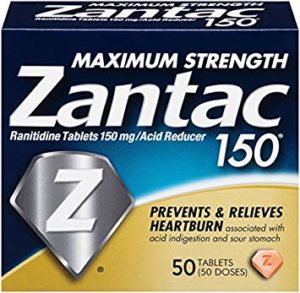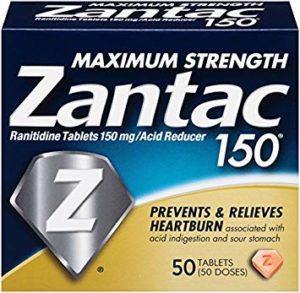(Nov. 5, 2019) Zantac  was recalled from store shelves by Walgreens, Rite Aid, and CVS last month over a cancer scare. Wal-Mart later joined in the recall, and Novartis also halted global distribution of its ranitidine drugs which are in the same class as Zantac.
was recalled from store shelves by Walgreens, Rite Aid, and CVS last month over a cancer scare. Wal-Mart later joined in the recall, and Novartis also halted global distribution of its ranitidine drugs which are in the same class as Zantac.
The nation’s largest drug store chains pulled the popular heartburn medication from their shelves after the Food and Drug Administration said that it had detected low levels of a cancer-causing chemical in samples taken of the drug. However, there’s more to the Zantac story than what the FDA has so far revealed.
Related: FDA says NDMA found in Zantac
FDA re: Zantac and NDMA
Though the FDA said as recently as Nov. 1, 2019 that the levels of NDMA (N-Nitrosodimethylamine) it has found in Zantac are not any higher than what one would find in grilled or smoked meats, the agency has thus far avoided a deeper discussion of how Zantac can become a potentially dangerous carcinogen.
The FDA web site stated on Nov. 1: “FDA has determined that the levels of NDMA in ranitidine and nizatidine [Zantac’s active ingredients] are similar to the levels you would expect to be exposed to if you ate common foods like grilled or smoked meats.”
Reuters, however, reported last month that the FDA said it found “unacceptable levels” of a cancer-causing impurity in the popular heartburn drug Zantac and its generic versions known chemically as ranitidine.
U.S. and European health regulators revealed last month that they were reviewing the safety of ranitidine after the online pharmacy Valisure flagged the impurities to regulators. Canada’s health authorities have asked the drug’s makers to halt distribution.
FDA testing vs. Valisure Testing
The FDA reportedly checked over-the-counter drugs using a low-heat method of testing. FDA said it found much lower levels of the impurity – N-nitrosodimethylamine (NDMA) – than were discovered with a higher temperature test used by Valisure.
NDMA had previously been found in some blood pressure meds such as Valsartan, a branded name from a class of drugs known as angiotensin II receptor blockers, or ARBs. Those potentially cancer-causing impurities are thought to have been introduced by recent changes in the drugs’ manufacturing process.
The FDA said Valisure’s higher temperature testing method generated very high levels of NDMA from the ranitidine drugs; the FDA claimed that method, which Valisure had used for testing ARBs, was not suitable for ranitidine.
Valisure said last month that it also suspects the high temperature method resulted in findings of higher NDMA levels. It said that it did not find NDMA in a body-temperature test of ranitidine it conducted.
Nevertheless, a Valisure analysis conducted in conditions similar to the human stomach generated more than 300,000 nanograms of NDMA. That number is significantly above acceptable levels set by the FDA, according to a Valisure company spokesman.
Valisure CEO David Light said that analysis shows that even if the pills are not contaminated, the drug is likely to form the impurity in patients’ stomachs after it is ingested.
The FDA has since asked ranitidine makers to conduct their own testing to assess levels of the impurity and to send samples of their products for testing by the agency. FDA will assess oral ranitidine medicines and has begun testing samples of other heartburn treatments such as proton-pump inhibitors as part of the investigation.
What’s the Problem with Zantac?
If the FDA’s somewhat tepid announcement about low levels of NDMA were all there were to the story of Zantac, then why would Walgreens, Rite Aid, CVS, and Wal-Mart pull it so quickly from their shelves?
The FDA’s Zantac NDMA posting on its web site Nov. 1, 2019 leads with this legend:
“FDA continues to investigate the presence of the N-Nitrosodimethylamine (NDMA) impurity in ranitidine and is now aware of NDMA in nizatidine, which is chemically similar to ranitidine. Both medicines are H2 blockers which decrease the amount of acid in the stomach. FDA has identified NDMA in ranitidine and nizatidine active pharmaceutical ingredient (API) and finished drugs. “
But the agency only concluded by comparing the amount of NDMA in Zantac with that found in grilled or smoked meat. That sounds pretty innocuous; but it is also misleading. Comparing the NDMA-related Zantac recall with that of Valsartan for NDMA contamination is instructive to show why.
Zantac vs. Valsartan
Valsartan, by contrast with Zantac, was contaminated with much higher levels of NDMA, which were produced in its manufacturing process. Zantac, on the other hand, has been found to produce dangerous levels of NDMA after the drug is ingested. The NDMA levels in Zantac have been found to spike and turn cancerous due to the reaction of the chemical after it enters the body and begins reacting to the body’s digestive system, beginning with saliva.
Is the FDA AWOL concerning Zantac?
The FDA has so far looked at Zantac pills mostly in a vacuum, and determined that they contain low levels of NDMA that don’t appear to be a cancer threat. The problem with that approach is that the NDMA levels in the pills themselves are not what cause the problem with Zantac. The problem with Zantac is that its active molecule – ranitidine and nizatidine – breaks down inside the human body. When a med like Zantac combines with nitrites in the stomach, hundreds of thousands of nanograms break apart in the stomach. Or, our own DDH enzyme in our kidneys or other organs can also shed off millions of nanograms of NDMA after being exposed to Zantac.
Zantac Risks
Zantac is not thought to cause lasting damage upon one or two uses. It is thought to cause damage over a period of time, perhaps over several months of use. In addition, the active ingredients in Zantac are thought to have a short life for bio-accumulation.
Stay tuned for more. We will update this ongoing story as it develops.
RELATED
- Zantac Lawsuit | Attorney
- FDA: NDMA found in Zantac
- Zantac Recall Cancer Scare
- Dangerous Drugs
- Drug & Medical Device Attorneys

by Matthews & Associates
Reuters, however, reported last month that the FDA said it found “unacceptable levels” of a cancer-causing impurity in the popular heartburn drug Zantac and its generic versions known chemically as ranitidine.
U.S. and European health regulators revealed last month that they were reviewing the safety of ranitidine after the online pharmacy Valisure flagged the impurities to regulators. Canada’s health authorities have asked the drug’s makers to halt distribution.
FDA testing vs. Valisure Testing
The FDA reportedly checked over-the-counter drugs using a low-heat method of testing. FDA said it found much lower levels of the impurity – N-nitrosodimethylamine (NDMA) – than were discovered with a higher temperature test used by Valisure.
NDMA had previously been found in some blood pressure meds such as Valsartan, a branded name from a class of drugs known as angiotensin II receptor blockers, or ARBs. Those potentially cancer-causing impurities are thought to have been introduced by recent changes in the drugs’ manufacturing process.
The FDA said Valisure’s higher temperature testing method generated very high levels of NDMA from the ranitidine drugs; the FDA claimed that method, which Valisure had used for testing ARBs, was not suitable for ranitidine.
Valisure said last month that it also suspects the high temperature method resulted in findings of higher NDMA levels. It said that it did not find NDMA in a body-temperature test of ranitidine it conducted.
Nevertheless, a Valisure analysis conducted in conditions similar to the human stomach generated more than 300,000 nanograms of NDMA. That number is significantly above acceptable levels set by the FDA, according to a Valisure company spokesman.
Valisure CEO David Light said that analysis shows that even if the pills are not contaminated, the drug is likely to form the impurity in patients’ stomachs after it is ingested.
The FDA has since asked ranitidine makers to conduct their own testing to assess levels of the impurity and to send samples of their products for testing by the agency. FDA will assess oral ranitidine medicines and has begun testing samples of other heartburn treatments such as proton-pump inhibitors as part of the investigation.




